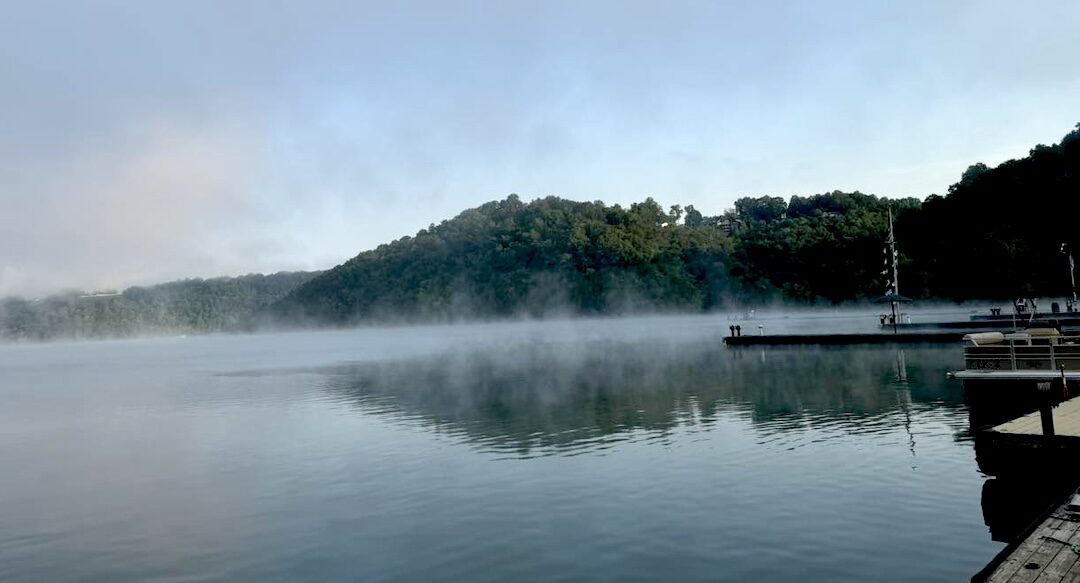Observe Safe Boating in Frigid Waters
Boating in frigid waters can be a breathtaking experience, with serene winter landscapes and fewer crowds on the water. However, cold weather boating also comes with significant risks, including hypothermia, cold shock and ice hazards. Whether you’re fishing, hunting, or simply enjoying the peaceful beauty of winter waters, taking the proper safety precautions is critical.
One of the best places for winter boating in Tennessee is Sunset Marina on Dale Hollow Lake. With its full-service marina, heated dock areas and cozy cabin rentals, Sunset Marina makes winter boating more accessible and comfortable, even in cold conditions.
Tom Allen, Sunset Marina’s owner offers these tips for safe boating in frigid waters.
Dress for the Conditions: Cold Water Boating Gear
When boating in cold weather, dressing appropriately can mean the difference between life and death in an emergency.
✔ Wear a Dry Suit or Wet Suit: A dry suit is the best option for keeping water out and insulating your body. A wet suit can also provide some protection but is less effective in extreme cold.
✔ Layer Up with Moisture-Wicking Fabrics: Avoid cotton, as it retains moisture. Instead, opt for synthetic or wool base layers, fleece insulation, and a waterproof outer layer.
✔ Wear a Proper Life Jacket: Choose a USCG-approved life jacket designed for cold water conditions. A foam-filled life jacket provides better insulation than an inflatable one, which may not work well in freezing temperatures.
✔ Protect Your Extremities: Cold hands and feet can lead to impaired motor function. Wear insulated, waterproof gloves and boots to maintain dexterity.
✔ Use a Hat and Neck Gaiter: The head and neck lose a significant amount of body heat, so cover them up with thermal gear.
Why Dale Hollow Lake is a Great Winter Boating Destination
Dale Hollow Lake is known for its pristine waters, excellent fishing, and scenic winter views. Sunset Marina, one of the lake’s premier marinas, offers year-round access and services that make winter boating more enjoyable.
✔ Heated Facilities & Dock Areas: Stay warm while prepping your boat.
✔ Houseboat & Cabin Rentals: Ideal for overnight stays with warm accommodations.
✔ Excellent Winter Fishing: Dale Hollow is famous for smallmouth bass, crappie, and trout, which are active even in colder months.
✔ On-Site Fuel & Supplies: No need to worry about running out of essentials in the cold.
If you’re planning a cold-weather boating trip on Dale Hollow Lake, Sunset Marina is an ideal launch point with its sheltered location and high-quality amenities.
Prepare Your Boat for Cold Weather Boating
Proper boat maintenance and safety equipment are critical for winter boating.
✔ Check Your Battery and Fuel System: Cold weather reduces battery efficiency. Ensure it is fully charged and in good condition. Use fresh, treated fuel to prevent freezing.
✔ Inspect Your Bilge Pumps and Drain Plugs: Ensure they are functional and free of ice.
✔ Carry Essential Safety Equipment:
- Marine radio (VHF)
- Flares and signaling devices
- Extra dry clothing in a waterproof bag
- First-aid kit
- Fire extinguisher
- Emergency blankets and hand warmers
✔ Know Ice and Weather Conditions: Before heading out, check for floating ice, shifting currents, and incoming storms. Even a thin layer of ice can damage a boat and create navigation hazards.
✔ Leave a Float Plan: Always tell someone your trip details, including your route, expected return time, and emergency contacts.
Cold Water Survival & Emergency Response
If the worst happens and you or a crew member falls into the water, immediate action can save lives.
✔ Get Back in the Boat ASAP: If the boat capsizes, try to climb onto it to stay out of the water. A partially submerged boat is easier to spot than a person in the water.
✔ Use the “1-10-1 Rule”:
- 1 Minute: Control your breathing after falling in.
- 10 Minutes: Maintain movement or adopt the HELP position to conserve heat.
- 1 Hour: Survival chances decrease significantly after an hour due to hypothermia.
✔ Have a Reboarding Plan: Use a ladder, sling, or rescue loop to help someone reenter the boat. Wet clothing should be removed, and dry layers should be added immediately.
✔ Call for Help: Use a VHF radio to send a distress signal and activate an emergency beacon if necessary.
Know When to Call It Quits
No trip is worth the risk if the weather conditions are too dangerous. If winds are high, ice is forming, or visibility is poor, postpone your trip.
✔ Check Weather Forecasts: Use marine weather apps or NOAA forecasts before departure.
✔ Trust Your Instincts: If conditions seem unsafe, don’t go.
“Boating in frigid waters can be a rewarding experience, but it comes with serious risks,” says Tom. “By dressing appropriately, understanding cold water dangers, preparing your boat and having an emergency plan, you can stay safe and enjoy the water, even in winter.”

